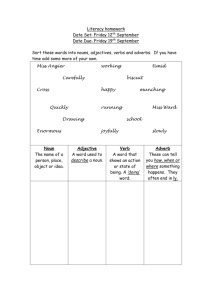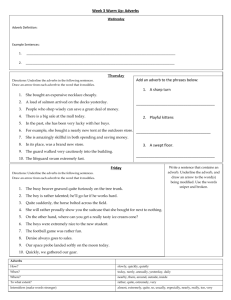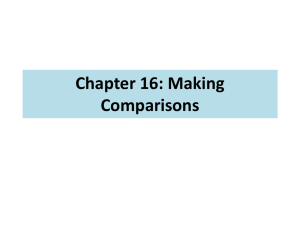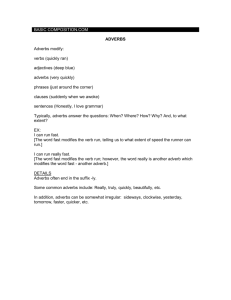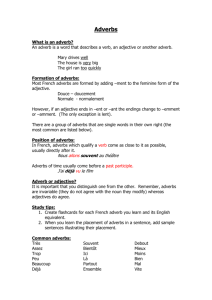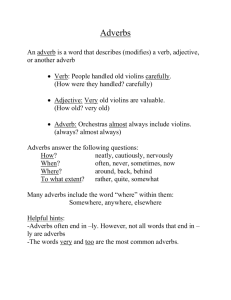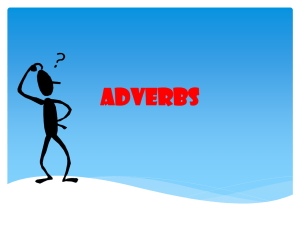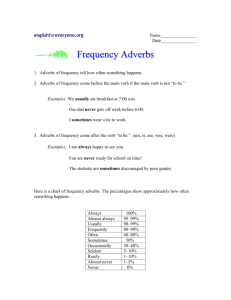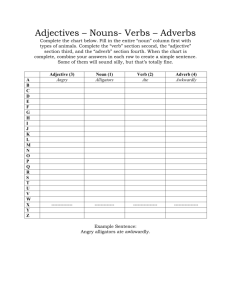Adverbs - Johnson County Community College
advertisement
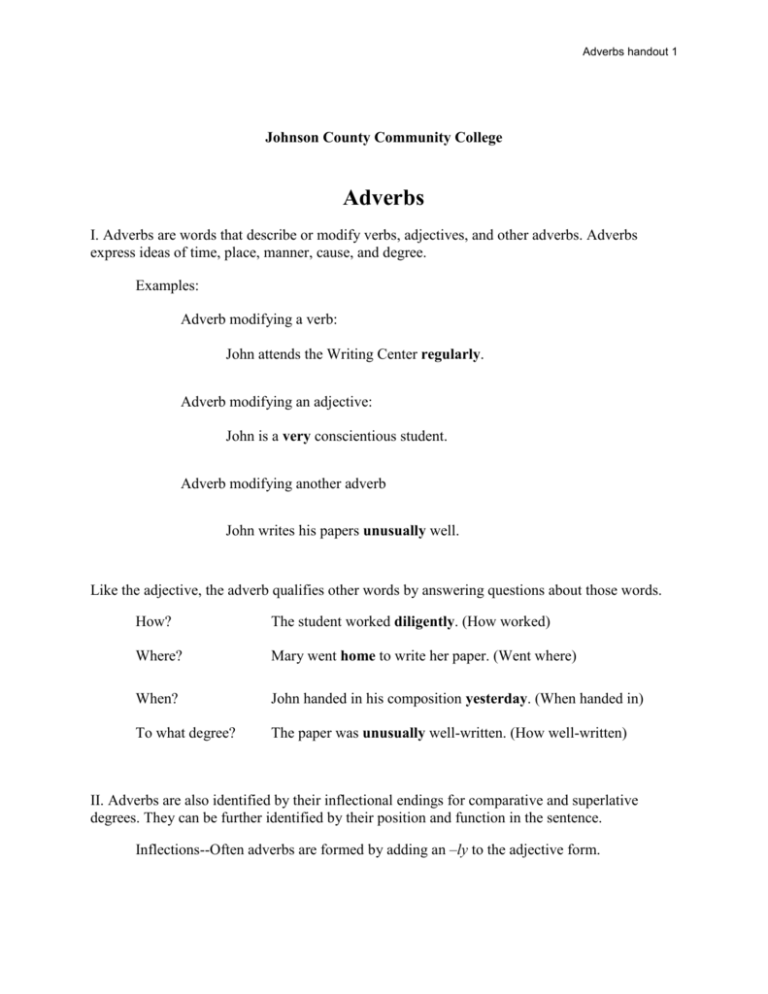
Adverbs handout 1 Johnson County Community College Adverbs I. Adverbs are words that describe or modify verbs, adjectives, and other adverbs. Adverbs express ideas of time, place, manner, cause, and degree. Examples: Adverb modifying a verb: John attends the Writing Center regularly. Adverb modifying an adjective: John is a very conscientious student. Adverb modifying another adverb John writes his papers unusually well. Like the adjective, the adverb qualifies other words by answering questions about those words. How? The student worked diligently. (How worked) Where? Mary went home to write her paper. (Went where) When? John handed in his composition yesterday. (When handed in) To what degree? The paper was unusually well-written. (How well-written) II. Adverbs are also identified by their inflectional endings for comparative and superlative degrees. They can be further identified by their position and function in the sentence. Inflections--Often adverbs are formed by adding an –ly to the adjective form. Adverbs handout 2 Examples: Adjective form Adverb form radiant certain odd impressive radiantly certainly oddly impressively Some adverbs will use the same form as adjectives. The adjective may not have a suffix or may already have an –ly ending. Examples: No suffix -ly suffix straight late far right hard early daily weekly hourly There are words that are almost always adverbs but are not identified by an –ly ending: rather always sometimes not so ever soon also somehow fast then anyhow somewhat here there anyway thus never today ever very now tomorrow indeed often too maybe only perhaps seldom yesterday quite very Adverbs form the comparative and superlative degrees similarly to adjectives. An -er is added to the positive form to make the comparative degree which shows a comparison between two things. An -est is added to the positive form to make a superlative degree which shows a comparison between one thing and several others. Examples: Positive Comparative Superlative soon late sooner later soonest latest Adverbs handout 3 If the adverb ends in –ly, more and most are used to form the degrees of comparison. Examples: Positive Comparative Superlative quickly tenderly more quickly more tenderly most quickly most tenderly Use less and least with the adverb to show a lesser degree. quickly less quickly least quickly Some adverbs from the comparative and superlative degrees irregularly: Positive Comparative Superlative well badly much far better worse more farther/further best worst most farthest/furthest Some prepositions may be used as adverbs to express a spatial relationship. Example: John let the cat in. (No object of preposition) III. Types: Interrogative adverbs ask a question--where, when, why, and how Why do you work so hard? Where are you going? Relative adverbs introduce relative or subordinate clauses--where, when, why and how When you are ready, we'll go. You did not tell me where you want to go. IV. Function and Position--Generally, the adverb is found in any position in the sentence, but usually near the word it modifies. When the adverb modifies another adverb or an adjective, it will be in front of the word it modifies. If the adverb is modifying a verb, however, the adverb can appear almost anywhere in the sentence--before or after the verb, between the helping and main verbs, or at the beginning or end of the sentence. Adverbs handout 4 Examples: Before verb--Mary often stays late. After verb--Mary stays often late. Between helping and main verb--Mary will often stay late. Beginning of sentence--Often Mary stays late. At end of sentence--Mary stays late often. Adverbs can modify entire clauses or sentences. Because they can modify so many different elements in the sentence, their positions can be more varied than other parts of speech. The eight meanings which adverbs can express are as follows: 1. Manner--Mary writes well. (Shows how Mary writes) 2. Degree--Mary's composition is too long. 3. Frequency--Mary attends the Writing Center often. (Shows how frequently Mary attends) 4. Time--Mary wrote her composition yesterday. (Tells when she wrote her composition) 5. Place--Mary wrote her composition here. (Tells where she wrote her paper) 6. Negation—Mary never writes her composition in the library. (Negates that she writes in the library) 7. Affirmation--Mary really likes to write. (Affirms that she likes to write) 8. Qualification--Mary will probably get a high grade on her composition. (Expresses the quality of certainty or probability) V. Problems with Adverbs Be sure to not confuse adverbs with adjectives, especially well with good. Well is an adverb; good is an adjective. Avoid double negatives. For instance, do not use hardly, scarcely, only, or never with no or not. Remember, one negative word to a clause is enough. Adverbs handout 5 Practice Exercise A Using the comparative and superlative degrees, compose your own sentence for the adverb given in parentheses. 1. (sooner) 2. (soonest) 3. (more quickly) 4. (more badly) 5. (most affectionately) 6. (most late) 7. (more agreeably) 8. (most carefully) 9. (most thoroughly) 10. (more responsibly) Practice Exercise B Choose the correct form in parentheses in the first five sentences. Compose sentences of your own for the words in parentheses (6-10). 1. The feeble man (wasn't, was) scarcely able to sit up in bed. 2. The sergeant didn't want (any, no) advice from (anyone, no one). 3. They (could, couldn't) hardly hear each other above the crowd. 4. Mr. Sand's work doesn't allow him (any, no) margin of error. 5. I (don't never, never) anticipate trouble. 6. (barely) 7. (hardly) 8. (never) Adverbs handout 6 9. (scarcely) 10. (none) Practice Exercise C Underline the adverbs in the following sentences. 1. My co-workers seldom attend the annual conference. 2. Have you ever seen this machine in operation? 3. Often Mr. Sands was in a very cheerful mood. 4. He responded intuitively to the call for help. 5. Sometimes he drove fast, but he was not reckless. 6. An exceptionally notorious outlaw once lived here. 7. Later he would regret having spoken harshly to Cynthia. 8. Some customers never pay their bills willingly. 9. Noisily the old truck came to a stop. 10. Now the mountain roads are relatively free of snow. 11. Sam visited us today. 12. Soon wild flowers will blanket the entire hillside. 13. Did Mr. Sands accept the loss philosophically? 14. Mr. Smith seldom saw a car along the bleak stretch of coast. Practice Exercise D Each of the blanks in these sentences is to be filled in by inserting an adjective or an adverb. If an adjective is called for, insert the adjective printed in parentheses. If, however, an adverb is required, insert the adverb formed from the adjective printed in parentheses. 1. The president of the company looked __________ on my suggestion. (cold) 2. Please return to the office as _________ as you can. (quick) Adverbs handout 7 3. We shall need _______ more information before we can give you an answer. (considerable) 4. I will _________ call you at your office at the time you have suggested. (sure) 5. The mistake she made has ________ caused her to feel __________ . (sure, bad) 6. Please speak just as ___________ as possible. (distinct) 7. You have improved ____________ in your work. (considerable) 8. His voice sounds _____________ over the telephone. (different) 9. How ____________ the stars look on a winter night! (cold) 10. The whole matter was managed ____________ from the beginning. (bad) 11. The whirr of the machinery sounds ___________ even at this distance. (loud) 12. I ____________ felt __________ after that experience. (sure, bad) 13. It looks____________ to see a young man wasting his time. (bad) 14. The machine is __________ suitable for our purposes. (perfect) 15. Mrs. Stone has been _________ successful in making the window display look __________. (moderate, good). 16. We have done an __________ large business this season. (unusual) 17. He is carrying an ___________ heavy burden. (unnecessary) 18. You do not speak ___________ enough to be heard in the back of the room. (plain) 19. I can see ________ enough that you do not understand the principle involved. (clear) 20. The cloth _________ feels __________ .(sure, smooth) Practice Exercise E Insert the word only at the proper places in these sentences. The sense in which only is to be used in the sentence is indicated by the words in parentheses. 1. This offer holds good for ten days. (not more than ten days) 2. Ms. Simpson is able to do this work. (no one else can do it) Adverbs handout 8 3. It will take a few minutes to get the figures. (not more than a few minutes) 4. I am calling to see whether I can be of further service. (for no other reason) 5. A person gets what he is worth. (not more than he is worth) Practice Exercise F In the blanks in these sentences insert good or well--whichever is correct. 1. She has been ill, and she still looks far from ________ . 2. Your handwriting is _______, and you write _________ . 3. He has done _______ in his new position. 4. Do you really feel __________ enough to come to the office? 5. He has not been a ________ man since he had that severe attack of illness last winter. 6. She did _______ in the test, and she made a __________ impression on the interviewer. 7. She is not yet __________ enough in her work to operate the machine _________ . 8. If you will do each piece of work __________, you will become a ________ office worker. 9. She is a ___________ stenographer and always does her work _____________. 10. If you want to be ___________ at all times, you must take _________ care of your health. Practice Exercise G Most of these sentences are incorrect; a few are correct. (1) Read the sentence carefully. (2) If it is correct, put a checkmark at the end of the sentence. (3) If it is incorrect, cross out each word which makes the sentence incorrect; then write the correct word over the word or words you crossed out. 1. It was so dark in the room that we couldn't hardly see. 2. I was so frightened that I couldn't scarcely tell where I was. Adverbs handout 9 3. There isn't but one orange left. 4. The work will not take but a week. 5. I hadn't scarcely finished the work when I was called to the telephone. 6. You wouldn't scarcely believe the trouble we have had with this machine. 7. You couldn't hardly tell the difference between the two girls. 8. He won't be but a few minutes. 9. Even now I do not hardly feel well enough to start work. 10. We hadn't hardly set out on the trip when the rain started to come down heavy. 11. He says that he can't find but two errors in the paper. 12. It seems to me that there are but two plans from which to choose. 13. That company hasn't hardly suffered at all. 14. I could scarcely bear to look at him. 15. You have done the work so good that you are entitled to a promotion. 16. I couldn't scarcely believe that not one of the courses offered in these departments are listed in the latest catalog. 17. He talks well, and he makes a good appearance. 18. It is a real remarkable record when you consider how bad the team played last year. 19. We can't hardly sell enough merchandise in this territory to pay the selling costs. 20. Our sales figures in that territory haven't hardly been lowered at all. Practice Exercise H Underline the correct form in parentheses. 1. Mary has felt (bad, badly) since her last cold. 2. Jim arranged the layout (crooked, crookedly). 3. The host nation gave the delegates a (real, really) friendly reception. Adverbs handout 10 4. The waitress ground the pepper (coarse, coarsely) for the salad. 5. An unknown arsonist set fire to (most, almost) all the houses on Quivira Road. 6. Sims anticipates failure too (ready, readily). 7. The brown sofa looks (well, good) against the beige drapes. 8. Nancy looked (bad, badly) when I last saw her. 9. Mr. Sands spoke to the nervous girl (gentle, gently). 10. I slept (good, well). 11. The watermelon tasted (sweet, sweetly). 12. The machine performed (good, well) for ten minutes. 13. (Most, Almost) all the votes have now been counted. 14. John worked out the answers (slow, slowly). 15. Dr. Anderson's wife was (sure, surely) right in saying he overworked. 16. Only one of the switchboard operators had a (real, really) pleasant voice. 17. At the end of the examination the doctor said I was not a (good, well) man. 18. Milk shakes don't look (well, good) to Tom unless they are thick. 19. The old prospector divided his meager stores with us (generous, generously). 20. Did you feel (bad, badly) about having to rewrite your theme? 21. The trio sang at the summer band concerts (regular, regularly). 22. The food was arranged on the trays very (appetizing, appetizingly). 23. His answers to questions were almost always given too (hasty, hastily). 24. She looked (quick, quickly) in the direction of the sound. 25. The poor girl continually spelled the word yacht (incorrectly, incorrect).
